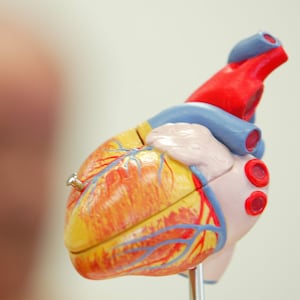Health
Recognizing Hidden Signs of Heart Disease: What You Need to Know

Heart disease remains a significant global health concern, claiming more than 18 million lives each year. While many associate heart attacks with the classic image of a stressed middle-aged male executive, the reality is that heart disease can affect anyone, and the symptoms are often subtle and overlooked.
According to Ruth Goss, a senior cardiac nurse at the British Heart Foundation, patients frequently misinterpret their symptoms. “I thought it was indigestion, then I went to hospital because it was a bit persistent, where they did an ECG, and to my astonishment I’d had a heart attack,” she recounts.
In the UK alone, cardiovascular disease is responsible for one in four deaths. On a typical day, 480 individuals will die from cardiovascular issues, with 270 hospital admissions due to heart attacks, as highlighted by Professor Dan Augustine, a cardiologist at the National Heart Clinic in Bath and medical director of Sports Cardiology UK.
Understanding the Symptoms
Heart disease can be hereditary, but lifestyle choices such as high cholesterol, smoking, lack of physical activity, and excessive alcohol consumption can significantly impact cardiovascular health. The symptoms of heart disease are generally categorized into three main types:
1. **Chest pain**, which can include angina, a condition where the heart muscle does not receive enough blood.
2. **Breathlessness**, often associated with heart failure.
3. **Palpitations**, which indicate heart rhythm disorders.
Despite these classifications, many individuals do not recognize non-traditional symptoms until it is too late. The misconception about heart attacks can lead to delayed treatment, which can have devastating consequences.
Importance of Awareness
Raising awareness about the broader range of symptoms associated with heart disease is crucial. Recognizing these signs can lead to earlier intervention and better outcomes for patients. Health organizations emphasize the need for education surrounding cardiovascular health to prevent avoidable deaths and improve overall public health.
Individuals are encouraged to pay attention to their bodies and consult healthcare professionals if they experience any persistent or unusual symptoms. Cardiovascular disease is both preventable and treatable; thus, understanding the risk factors and symptoms is vital for safeguarding heart health.
As healthcare providers continue to advocate for increased awareness, the hope is that fewer people will face the shocking realization of having suffered a heart attack. By recognizing the nuanced symptoms of heart disease, individuals can take proactive steps to protect their cardiovascular health and potentially save their lives.
-

 World3 weeks ago
World3 weeks agoPrivate Funeral Held for Dean Field and His Three Children
-

 Top Stories3 weeks ago
Top Stories3 weeks agoFuneral Planned for Field Siblings After Tragic House Fire
-

 Sports3 months ago
Sports3 months agoNetball New Zealand Stands Down Dame Noeline Taurua for Series
-

 Entertainment3 months ago
Entertainment3 months agoTributes Pour In for Lachlan Rofe, Reality Star, Dead at 47
-

 Entertainment2 months ago
Entertainment2 months agoNew ‘Maverick’ Chaser Joins Beat the Chasers Season Finale
-

 Sports3 months ago
Sports3 months agoSilver Ferns Legend Laura Langman Criticizes Team’s Attitude
-

 Sports1 month ago
Sports1 month agoEli Katoa Rushed to Hospital After Sideline Incident During Match
-

 Politics2 months ago
Politics2 months agoNetball NZ Calls for Respect Amid Dame Taurua’s Standoff
-

 World4 weeks ago
World4 weeks agoInvestigation Underway in Tragic Sanson House Fire Involving Family
-

 Entertainment1 week ago
Entertainment1 week agoJacinda Ardern Discusses Popularity Decline on Graham Norton Show
-

 Sports2 weeks ago
Sports2 weeks agoEli Katoa Shares Positive Recovery Update After Brain Surgery
-

 Top Stories3 weeks ago
Top Stories3 weeks agoShock and Grief Follow Tragic Family Deaths in New Zealand














